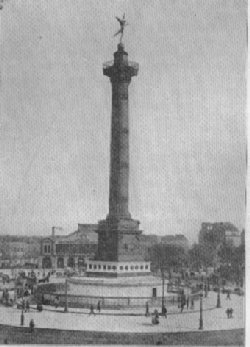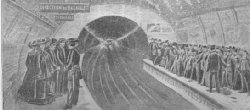The immediate forerunner of the present form of government was a national assembly, elected to treat with Germany in 1871, after France had been humiliated in the Franco-Prussian War. This assembly found itself in control of the situation, and, while its members were largely monarchical in their views, seeing the tendency of the people toward republicanism, they framed a meager constitution and put it into effect without reference to the people. France has three branches of government—legislative, executive and judicial—yet they are so strongly centralized that they may not be compared with similar branches in other republican forms of government. For elective and administrative purposes, France is divided into 86 departments which are divided into 362 smaller districts, which are, in turn, divided into 2,899 cantons, and these are subdivided into still smaller divisions called communes, of which there are 36,170. A chamber of deputies, made up of 584 members elected for four years, and a senate whose members are elected for nine years, one-third retiring every three years, make up the legislative department. Every male citizen 21 years old, who is not disqualified and who has lived six months in a commune, may vote. Deputies must be 25 years old; they receive $1,800 a year and have free transportation on all railroads. These men, generally, are retired merchants, doctors or farmers, and are of only ordinary attainments. Senators, to be eligible for that office, must be 43 years old; they receive the same salary as the deputies. Ordinarily, their age is over 60 years. Deputies are elected directly from their districts, though some of these districts are large enough to elect two or more. The elections are held on Sunday. In case no candidate has a majority of votes in an election, nor receives one-fourth the number of registered votes in his constituency,another election is called for two weeks later. Then a plurality elects, and in case of a tie, the oldest of the candidates is chosen. Senators are chosen by electoral colleges and come from the departments. These colleges are composed of members of the council general of the department and of the different councils of the districts of the department, senators and deputies of the department, and electors chosen from the municipal councils of the numerous communes of the department; retired professional men of the country towns are generally elected. The duties of the senate extend principally to advising with the President as to when the chamber of deputies shall be dissolved, and in sitting in his high court in case of impeachment for grave offenses against the state. In most instances, the senate is the inferior body of the legislature. The executive department is headed by the President who may never be a member of the royal family, and who is elected by the chamber and senate sitting in joint session. His salary is $125,000 a year; he has a great retinue of servants, and has free use of the great "palais d'elysees" of Paris. He does not have the veto power on legislation, yet he may return bills for a second vote. He may adjourn the houses for one month, may close a session that has lasted over five months, and by the consent of the senate may dissolve the chamber of deputies. The cabinet of the President is made up of the heads of 11 departments, such as war, finance, marine, etc., who receive a salary of $12,000 a year. These advisers of the President are chosen generally upon the recommendation of the presidents of the two houses. They are members of the two houses and wield considerable influence. The members of the cabinet frame legislation, sanction the acts of the President, in order to make them valid, and speak in both houses, whether they are members of both or not. When they cannot control legislation, they resign and a new cabinet is chosen. Although the President is elected for seven years, and the life of the average cabinet is less than a year, yet the government is rather by the cabinet than by the President, who has little real power and is largely a luxurious figurehead. When each annual session is begun in the chamber of deputies legislation is started by the choice, by lot, of eleven bureaus, while the senate selects nine in the same manner. A committee for parliamentary initiative is chosen from these bureaus to serve one month, to which are referred all measures when presented. This committee decides whether they are worthy of consideration. It considers a bill, has it printed and presents it to a subcommittee of the respective bureaus for further consideration along party lines. When the bill has been thrashed out to suit the views of the committee, it is presented before the house by a commissioner who reads it from a little gallery called a tribune, which is located just above and behind the desk of the president of the house. The speaker of the house, unlike the corresponding officer in the United States house of representatives, has little power. Parliamentary usages in France are very crude and members and even the president of a house will resort to trivialities, epithets and even violence in open session. The council of state, a relic of the days of Napoleon, is another body. It is made up of professional men who simply give their opinions on profound subjects for legislation, but it is rarely followed. Favoritism and subsidy go hand in hand in the administration of affairs. Power in France is the main thing sought after by members of the government. The cabinet, in order to retain the good will of the chamber of deputies, upon whose whim it must stand or fall, deals out many favors in the way of offices, etc., to the minor members. The good will of the public also must be maintained in order to hold seats in the houses, and great sums of money, placed in the hands of the government for secret-service work, are frequently spent in bribing influential newspapers to support the officials of the administration. The judiciary of France differs widely from that of other countries. In her courts a man often is considered guilty until proved innocent. There is no grand jury, one judge sitting in private and deciding whether cases shall or shall not be brought to trial. The system of courts starts with the usual local justices of the peace, and ascends through courts of appeals to the final supreme court. The President, with the aid of the minister of justice, appoints the judges who, except the local justices, hold office during life. There is a special court made up of men of expert training to decide disputes within the administration, or between citizens and officers. Many courts, whose jurisdiction covers cases where sentences of but three or four years imprisonment may be imposed, are made up of three judges, who sit without juries. Higher courts have the adjunct of twelve jurors, who decide cases by a majority vote. Commercial cases are tried before special courts, made up of experts. To show how centralized the whole government of France is, it may be stated that even in local government the prefect or governor of each department is appointed by the President and is answerable to the cabinet. This officer is assisted by a general council elected for six years, and consists of one representative from each Canton. These govern schools, railroads, local courts and asylums. In like manner, the District or arrondissement, the next smaller division, has a subprefect appointed by the prefect of the Department, responsible to him, and really acting as his agent. The work of dividing the taxes among the Communes is done by a council, which is made up of a member elected from each of the Cantons.
THE GOVERNMENT OF RUSSIA |

